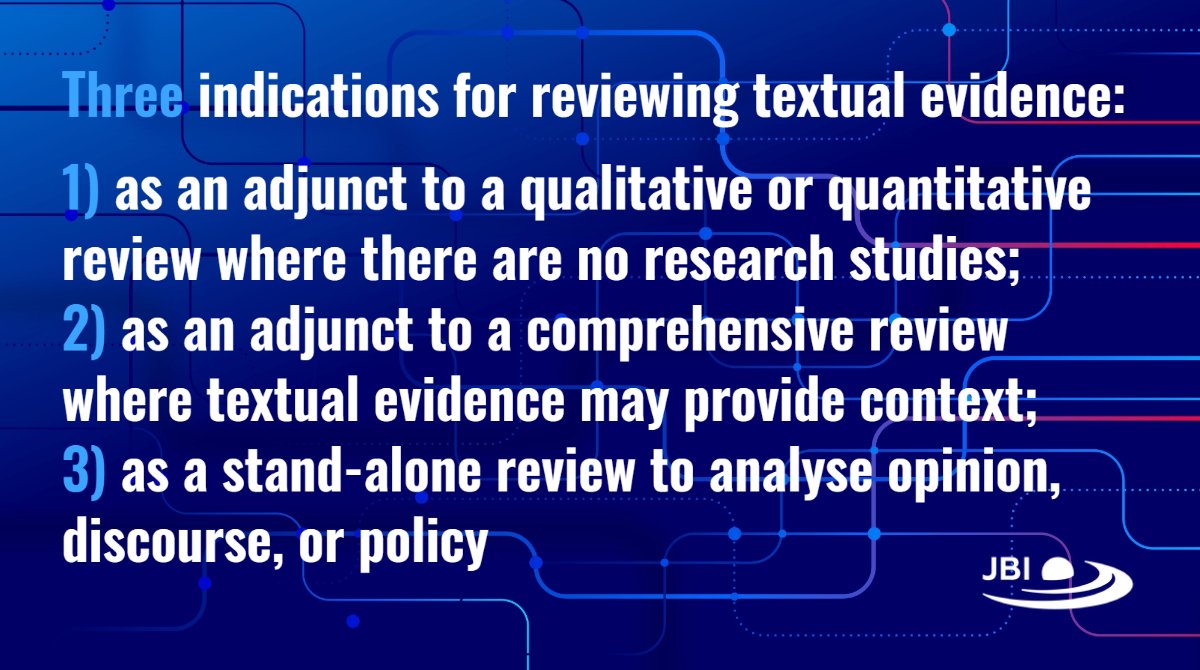
To celebrate #JBIMethodology Month, we share the @JBIEBHC approach to the systematic review of textual evidence in this #tweetorial 1/13
@alexamcarthur1 @jitka_klugarova @ACooperSF
@alexamcarthur1 @jitka_klugarova @ACooperSF
@JBIEBHC takes a comprehensive view regarding what counts as evidence to inform healthcare policy & practice 2/13
First developed in 2004, the @JBIEBHC approach to the systematic review of textual evidence seeks to determine the authenticity and credibility of textual evidence sources. The methodology has been reviewed and is currently being finalised 3/13
Q: What is textual evidence?
A: Documented communication to address a clinical question or concern from any stakeholder perspective. This includes evidence derived from narrative, opinion and policy, and is grounded in principles of discourse analysis 4/13
A: Documented communication to address a clinical question or concern from any stakeholder perspective. This includes evidence derived from narrative, opinion and policy, and is grounded in principles of discourse analysis 4/13
Q: What is it not?
A: The need for pragmatism prevails, and so content found in sources such as social media or videos are currently not included as valid forms of textual evidence for inclusion in a review 5/13
A: The need for pragmatism prevails, and so content found in sources such as social media or videos are currently not included as valid forms of textual evidence for inclusion in a review 5/13
Q: Why conduct a review of textual evidence?
A: @JBIEBHC has long argued that, where no other evidence exists, this kind of "non-research” data could legitimately be considered to inform policy & practice decisions. However .... 6/13
A: @JBIEBHC has long argued that, where no other evidence exists, this kind of "non-research” data could legitimately be considered to inform policy & practice decisions. However .... 6/13
.... it is important that it is treated with the same critical lens as would be applied to any other form for evidence 7/13
Q: When is it appropriate to conduct a review of textual evidence?
A: There are 3 indications for reviewing textual evidence: 8/13
A: There are 3 indications for reviewing textual evidence: 8/13
1) as an adjunct to a qualitative or quantitative review where there are no research studies;
2) as an adjunct to a comprehensive review where textual evidence may provide context;
3) as a stand-alone review to analyse opinion, discourse, or policy 9/13
2) as an adjunct to a comprehensive review where textual evidence may provide context;
3) as a stand-alone review to analyse opinion, discourse, or policy 9/13

Q: How do you conduct a systematic review of textual evidence?
A: Following the same high-level process as for any other review: search, appraise, extract, synthesise 10/13
A: Following the same high-level process as for any other review: search, appraise, extract, synthesise 10/13
Q: What are the key changes to the revised @JBIEBHC methodology?
A: It is proposed that critical appraisal should be different for each type of text (narrative, opinion, policy). The other steps in the review process remain largely unchanged 11/13
A: It is proposed that critical appraisal should be different for each type of text (narrative, opinion, policy). The other steps in the review process remain largely unchanged 11/13
Q: What are the future directions/considerations for this methodology?
A: One unresolved issue includes whether to separate data into “sub-groups” prior to synthesis 12/13
A: One unresolved issue includes whether to separate data into “sub-groups” prior to synthesis 12/13
Reviews of textual evidence offer great potential regarding dealing with uncertainty in a real and systematic way. Where research evidence is not yet available, textual evidence offers important and legitimate insights to inform policy and practice 13/13 #JBImethodology @JBIEBHC
• • •
Missing some Tweet in this thread? You can try to
force a refresh



